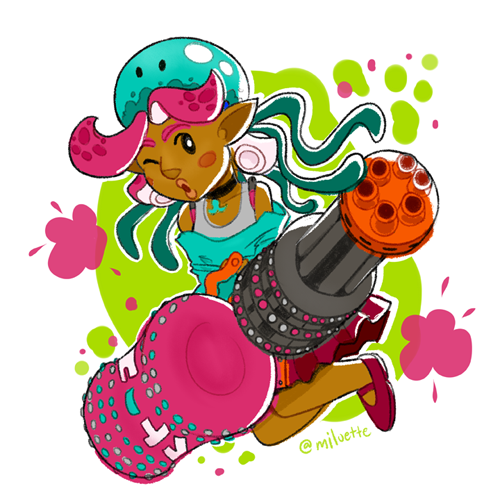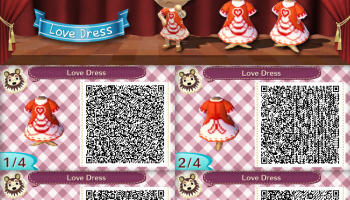
Splatoon, Nintendo’s first, greatest foray into the realm of online shooters, turned a year old on the 27th! I drew this picture for the occasion!
This game, matched perhaps only by Overwatch in the “appealing, colorful shooters made in the past year” category, managed to fully replace Team Fortress 2 for me by being:
- Easy to play
- Fun beyond its novelty
- Genuinely captivating gameplay-wise
- Nice to look at
Not only is the basic concept of the game fun — this shooter where you, a squid kid, cover the field in ink, able to move through your team’s ink easily — it’s also very stylish, with great music and peripheral design elements. There’s even a modicum of worldbuilding that suggests a lot about its setting — something I may go more into in a spoiler post later on. (No doubt things you can already find out more about via Google.) The gameplay itself is very fun and engaging too, with many configurations and ways to approach situations based on your objective. It’s also the only game on the Wii U that makes full, good use of the gamepad, and alone justifies it. And guess what — no paid DLC either!
The game, of course, has its issues, mostly in aspects of game balancing and matchmaking (from my experience), but it’s hardly affected by the things people complain about, or at least what they did about in the early days.
“But there’s no voice chat!”
Splatoon conveys a LOT of information to you, the vigilant player, constantly, at any given moment, via audio cues, vibration, the HUD, and the gamepad itself.
It tells you:
- The entire layout of the stage
- How much of the stage is controlled by your and the other team
- If, when, and where a powerup is incoming
- The flag’s location
- Zones to capture
- When one of your teammates has used a powerup
- If the enemy has used a powerup
- The location of your enemies when inked or echolocated
- How many teammates are down
- Other info, like explosive’s locations, depending on your gear
- Your teammates’ locations
- What your teammates’ weapons are
In my experience, in other shooter-type games, you have to convey most of that information via voice. Here, you do not. And it’s preferable, both for people who have anxiety talking to formless voices and for people who just don’t want to put up with loudmouths.
Based on all that incredibly accessible information, you can make informed decisions at every turn and position yourself with the correct gear! It’s challenging but not hard. And it’s certainly far from impossible, especially considering that, unlike other shooters, the matches are a maximum of 3-5 minutes.
When I think about all of this, I get overwhelmed with how well the game is designed. And there’s the visual design, too — looking at the doodles in the credit scenes or the concept art from the artbook, I well up with pride knowing that the fundamentals of all corners of this game were considered. It’s hard not to get emotional! I love it when something good comes together, truly more than the sum of its parts.
Here’s to more years of Splatoon to come! I’m excited for the new Squid Sisters amiibo!
Inklings and Splatoon © Nintendo




